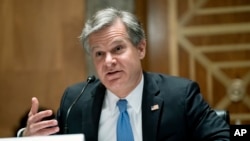U.S. national security and law enforcement agencies are battling what they describe as a “significant jump” in threats from domestic terrorists, many of whom are acting on their own and motivated by racial animosity or anti-government ideology.
Officials, testifying before lawmakers Tuesday, echoed warnings from earlier this year that the most lethal threats to the United States are homegrown, with white supremacist ideology and personal grievances driving a growing number of so-called lone actors to action.
“Certainly, the domestic terrorism caseload has exploded,” Christopher Wray, director of the FBI told a Senate committee, calling the prevention of terrorist attacks the bureau’s top priority “now and for the foreseeable future.”
“We've more than doubled our domestic terrorism caseload, from about 1,000 to about 2,700 investigations,” Wray said of the past 16 to 18 months. “We've surged personnel to match more than doubling the number of people working that threat from a year before.”
Part of that jump stems from the January 6 attack on the U.S. Capitol, which resulted in the deaths of five people and has led to more than 600 arrests.
But in prepared testimony, Wray warned the siege of the Capitol “demonstrates a willingness by some to use violence against the government in furtherance of their political and social goals.”
He also said that many of the lone actors, whether motivated by domestic grievances or by foreign terrorist groups, are relying heavily on the internet, something he said makes them hard to trace.
"Because they act alone and move quickly from radicalization to action, often using easily obtainable weapons against soft targets, these attackers don't leave a lot of dots to connect," Wray told lawmakers.
He also warned that in just the past couple of years, the FBI has managed to thwart terror attacks on a number of major U.S. cities, including New York, Las Vegas and Miami.
Foreign terror threats
Despite the growing threat from domestic extremists, U.S. officials cautioned that the threat from foreign terror groups, like Islamic State (IS) and al-Qaida, has only somewhat diminished.
"Foreign terrorist groups continue to place a premium on attacks against the United States,” Christine Abizaid, the director of the National Counterterrorism Center told lawmakers, describing the threat only as “less acute" than it was 20 years ago, when al-Qaida terrorists carried out the 9/11 attacks on New York’s World Trade Center and on the Pentagon.
“While years of [counterterror] pressure has degraded the al-Qaida network, the group and its affiliates remain intent on using individuals with access to the United States to conduct attacks," she said.
Iran
In addition to groups like al-Qaida and IS, Abizaid warned that counterterrorism officials are concerned about efforts by Iran and by its proxy, Hezbollah, to lash out at the U.S.
Specifically, she warned that Iranian leaders remain "intent on retaliating in the United States for the January 2020 killing of former IRGC Quds Force commander Qassem Soleimani.”
Abizaid further warned in written testimony of Tehran’s ongoing efforts to “build operation capacity against U.S.-based organizations and people.”
China
More than Iran, however, FBI Director Wray told lawmakers than no country poses quite as grave a threat to the U.S. as Beijing, which has forced the bureau to open up a new counterintelligence investigation, on average, every 12 hours.
“I think there is no country that presents a greater threat to our innovation, our economic security and our democratic ideas than the People's Republic of China, which is why we have over 2,000 active investigations tied back to the PRC government across all 56 field offices,” he said. “It is an almost 1,300% increase in economic espionage investigations tied to China from about a decade ago.”
U.S. officials also accused China of trying to exploit the coronavirus pandemic to “profit from the production of fraudulent PPE [personal protective equipment] and medical supplies.”
China “continues to engage in intellectual property theft, the exploitation of vulnerable supply chains and use of economic coercion to threaten our economic security,” Homeland Security Secretary Alejandro Mayorkas told the lawmakers.
Ransomware
Both Wray and Mayorkas also listed ransomware attacks, many linked to Russia, as a persistent threat.
"Last year, victims paid an estimated $350 million in ransoms, a 311% increase over the prior year, with the average payment exceeding $300,000," Mayorkas said.
“We're now investigating over 100 different types of ransomware, each with scores of victims," the FBI’s Wray added.








